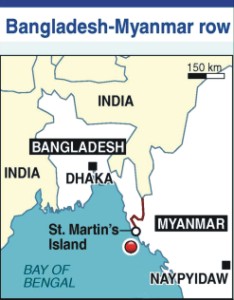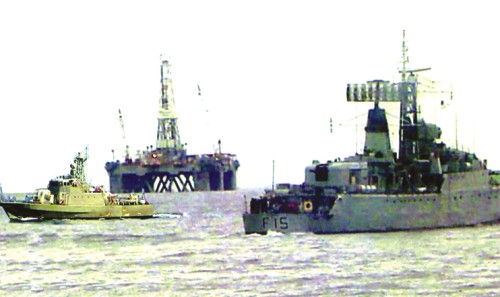 Current Affairs Current Affairs
Lessons to Learn in the Murky Water
Ahmede Hussain
After secretly awarding the area to North Korean oil and gas exploration giant Daewoo, two Myanmarese Navy warships intruded into Bangladeshi waters at the Bay of Bengal last Saturday, to escort four hydrocarbon exploration vessels. The area is believed to be rich in mineral resources as India and Myanmar (formerly Burma), Bangladesh's two immediate neighbours, discovered 100 trillion cubic feet of gas and two billion barrels of oil, and seven trillion cubic feet of gas respectively two years ago.
Bangladesh Navy tried to thwart the intrusion by sending three ships to where the Myanmarese had started building a rig only to confront an obdurate Myanmarese Navy who told our men in uniform that it was actually Myanmarese water. Intense diplomatic manoeuvre ensued, which resulted in the Korean company dismantling the rig.
The issue, however, is refusing to die down, for news has started to come from Bangladesh's 173km-long remote border area with Myanmar that Nasaca, the country's border guards, infamous for their brutal human rights abuses, has deployed a unit on the other side of the fence. Myanmar has later deployed its army along the Naf, prompting Bangladesh to deploy its own troops. There are unofficial reports that the Nasaca is setting fire to the homes of the Muslim Rohingya minorities who live in its Rakhine (formerly Arakan) State, to forcibly push them into Bangladesh, like the way it drove 250,000 Rohingyas into Bangladesh in 1991.
The incident is indeed embarrassing for our foreign office as the recent Myanmarese intrusion is followed by a 'high-powered' delegation led by the country's General Maung Aye, senior vice general and seven other cabinet ministers. Even before the visit, Dhaka held two rounds of talks with Naypyidaw regarding the common usage of the Naf and its estuary in April and September, which the ministry then said produced 'good results'.
 |
| A photo sent by the Inter Services Public Relations shows two Bangladesh Navy ships positioned near Korean rig Trans Water Legend in the disputed waters of the Bay of Bengal. |
Even though the Myanmarese intrusion has visibly caught our foreign office off guard, it was not unexpected. The sea-boundary of the countries has remained undemarcated with Bangladesh asking for equity basis North to South demarcation whereas Myanmar wants an eco-distance system in East to West boundary. Given that the issue of establishing the country's economic rights over the area should be of utmost importance, Bangladesh's lethargic bureaucracy could not have handled it any more sloppily. The country took the 'initiative' of drawing its maritime boundary four years ago, and it formed a committee in this regard, but within a year it ceased to remain functional. Even though Bangladesh has had plans to bring in western experts to draw its deep-sea boundaries, no significant step has so far been taken to that effect. Such negligence from the part of the government, which is supposed to safeguard the sovereignty of the country, is indeed deplorable. Bangladesh requires to file its claim under the United Nation's Convention on the Law of the Sea by July 27, 2011; India and Myanmar, on the other hand, have to do it by the middle of the next year, which means that both of Bangladesh's neighbours will want to assert its territorial claim over the bay in the next one year.
Last week's incidents at the bay have shown us where the slipshod works of our lackadaisical bureaucracy can lead us to if it is given a free hand. The government, before it starts to move any further with maritime boundary demarcation, must identify the mistakes that it has made. It must also find out the public servants for whose negligence we have not yet been able to start the process.
It is true that as a peace-loving nation we will rely on diplomacy, and seek the peaceful resolution of conflict. Having said that, we must also ready ourselves for any eventualities if anyone does not want to leave us in peace. The intrusion has shown how easily our nation's security can be threatened by its external enemies. It is a pity that the country does not have any Maritime Patrol Aircraft to guard is territorial water. It is essential for us to build a strong navy, especially when the only opening that the country has is through the Bay of Bengal. We need to acquire submarines, along with which our presence in the waters, particularly in the offshore areas of the bay has to be strengthened. A squadron of ship-on helicopters is essential to guard the water; joint exercises in our water with big superpowers will help to build the capacity of our armed forces.
Strategically speaking, the recent discovery of oil and gas and the location of our country as a gateway to China and India, the two regional superpowers, have put Bangladesh in an advantageous position on the geo-political map of the world. Bangladesh now boasts a steady economic growth of 6-7 percent, which has the potential to increase even further.
Defending our economic interests should get the utmost priority. The keenest of lessons that the Myanmarese intrusion into Bangladeshi waters has taught us is perhaps that.
Copyright (R) thedailystar.net 2008 |
